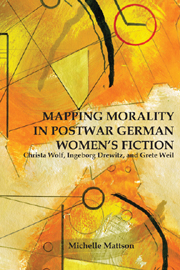Book contents
- Frontmatter
- Contents
- Acknowledgments
- Introduction
- 1 The Individual, Memory, and History
- 2 Feminism, the Self, and Community
- 3 Ingeborg Drewitz: Families, Historical Conflict, and Moral Mapping
- 4 Christa Wolf: Rehearsing Individual and Collective Responsibility
- 5 Grete Weil: The Costs of Abstract Principles
- Conclusion
- Bibliography
- Index
Introduction
Published online by Cambridge University Press: 05 February 2013
- Frontmatter
- Contents
- Acknowledgments
- Introduction
- 1 The Individual, Memory, and History
- 2 Feminism, the Self, and Community
- 3 Ingeborg Drewitz: Families, Historical Conflict, and Moral Mapping
- 4 Christa Wolf: Rehearsing Individual and Collective Responsibility
- 5 Grete Weil: The Costs of Abstract Principles
- Conclusion
- Bibliography
- Index
Summary
THIS BOOK CENTERS ON several novels by Christa Wolf (1929–), Ingeborg Drewitz (1923–86), and Grete Weil (1906–99). In particular, the study examines their attention to questions of moral responsibility in the second half of the twentieth century. All three writers seek to illustrate how our understanding of the historical present, informed as it is by our personal and our shared memories, shapes how we see our moral responsibilities in a world with increasingly porous and shifting community boundaries. They anchor their exploration of individual and collective responsibility within the family, moving out along different routes through local, national, and finally international communities. With little certainty, but a considerable sense of urgency, they attempt to map the moral geography of western European society in the second half of the twentieth century. In all three cases, furthermore, the inquiry is driven by their reflection on the individual's place within broader historical developments.
Why focus on these particular writers and these questions? The issue of responsibility played a considerable role in much of postwar German literature — one need only think of such writers as Heinrich Böll, Martin Walser, Max Frisch, Wolfgang Borchert, Hans Magnus Enzensberger, Rolf Hochhuth (to name just a few) to realize that questioning responsibility is not unique to the three writers at the heart of this study. Nonetheless, my readings within German Studies have drawn my attention increasingly to these authors.
- Type
- Chapter
- Information
- Mapping Morality in Postwar German Women's FictionChrista Wolf, Ingeborg Drewitz, and Grete Weil, pp. 1 - 10Publisher: Boydell & BrewerPrint publication year: 2010

